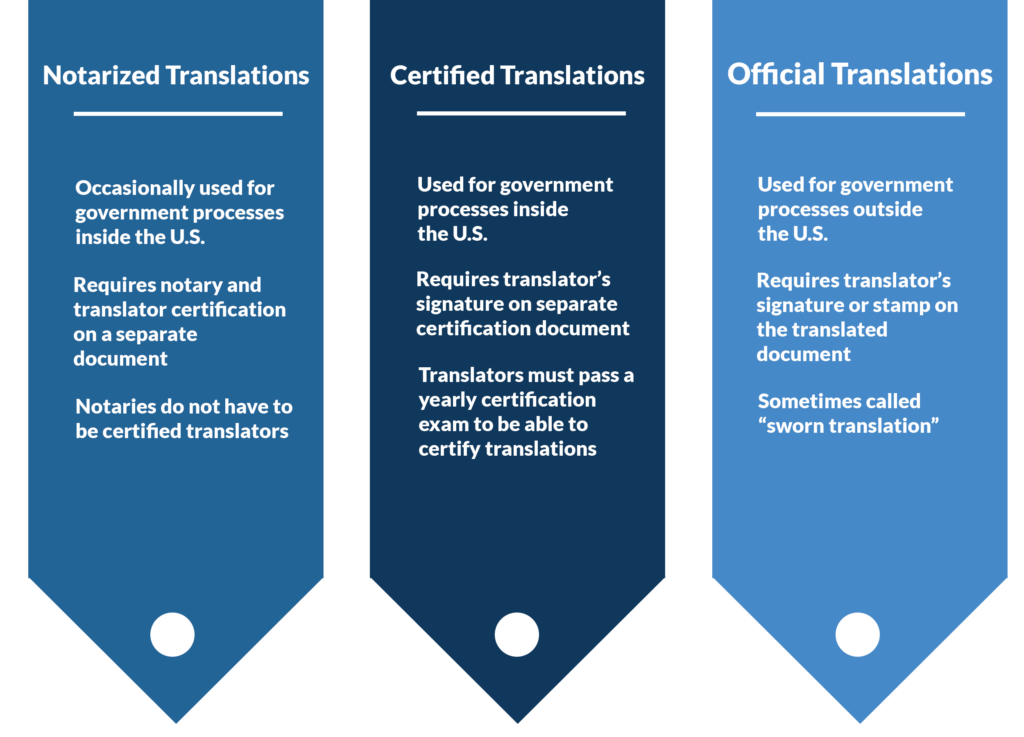The United States Citizenship and Immigration Services (USCIS) has a set of specific translation requirements that must be met for your immigration applications or official procedures to be processed successfully. These include the need for a certification statement from the translator, affirming their competency and the accuracy of the translation. Then, do immigration translations need to be notarized?
For immigration translations, USCIS does not explicitly require notarization. However, some people choose to have their translated documents notarized for added assurance. This is especially true for legal documents or other sensitive materials. We kindly suggest you take a moment to read through our extensive article about notarized translation online. It will provide you with a deeper understanding of this outstanding service.
But then, if they don’t require a notarized translation, what are the requirements for translated documents for USCIS? As a government entity, the USCIS’ translation requirements are a bit more intense than those required for marketing translation. Let’s review some of them.
USCIS Translation Requirements
Accuracy and Full Translations
The translation must be accurate and complete. The translated document should closely resemble the original document’s format, so all text in the document must be translated, including seals, signatures, or other parts that may appear insignificant but are part of the document. Any errors or omissions can result in delays or even the rejection of an application.
A Qualified Translator
It’s common to see questions such as “Who can translate legal documents for USCIS?” or “Can anyone translate a document for USCIS?” The answer is simple. Regarding legal documents, not just anyone can translate them for USCIS purposes. The translator must be certified and competent in both the source and target languages. However, USCIS does not require the translator to be officially certified by a professional organization. Just keep in mind that applicants shouldn’t translate their own documents, as this could lead to questions about impartiality and accuracy.
Certification
The certification is key to getting your translated document approved. A certification from the translator or translation agency must accompany the translation. This certification should state that the translator is competent to translate the document and that the translation is accurate to the best of their knowledge and ability.

For some documents, such as birth certificates, the translation should have a statement. This certification statement should include the translator’s name, signature, address, and certification date. Some agencies provide a notarized certification to add an extra layer of verification, although this is not a USCIS requirement. On the other hand, USCIS provides some forms that may require the translator to fill out, affirming their competency and the accuracy of the translation.
Additional Requirements
Multiple Pages: If the document consists of multiple pages, each should be translated and certified. If the pages are not individually numbered, the translator should indicate this.
Updates: A new certified translation will be required if there are any changes or updates to the document after the initial translation.
Best USCIS Certified Translation Services
Choosing the best USCIS-certified translation services is crucial for a smooth immigration process. Look for services with a track record of providing accurate and timely translations that meet USCIS standards.
Online vs. In-Person Services
The digital age has made accessing certified translation services online easier than ever. This is particularly useful during times when it may be challenging to visit a physical location. Online services like Traduality offer the convenience of remote access while still providing the certified translations required by USCIS.
When it comes to online translation services, does USCIS accept Google Translate as a qualified translator? The answer is no. USCIS does not accept translations from Google Translate or any other automated translation services. This means that a qualified human translator must translate and certify the document.
How Much Does USCIS Translation Cost?
The cost of USCIS translation can vary depending on the document’s complexity and the translation service’s rates. However, it’s essential to consider that a lower cost might mean lower quality, so we recommend prioritizing quality when it comes to translations for USCIS. A poorly translated document can result in misunderstandings, delays, or even the rejection of your application. Therefore, investing in a reputable translation service, such as Traduality, is advisable to ensure high-quality, certified translations that meet USCIS standards.
Summing up, USCIS primarily requires a translation certification by a translator, attesting their competency in both languages and the accuracy of the translation. Notarization is only an additional step that some people choose for extra assurance.
Understanding the ins and outs of USCIS translation requirements can be daunting, but it’s crucial for a smooth immigration process. Choose a reliable and reputable service whether you opt for notarized translations or stick with certified ones.
USCIS-Approved Translations are Just One Click Away
If you’re looking for a trusted partner to handle your translation needs, consider creating a project request with Traduality. With our expertise and commitment to quality, you can rest assured that your documents will meet all USCIS requirements. Sign up for free today or contact us for more information.





0 Comments